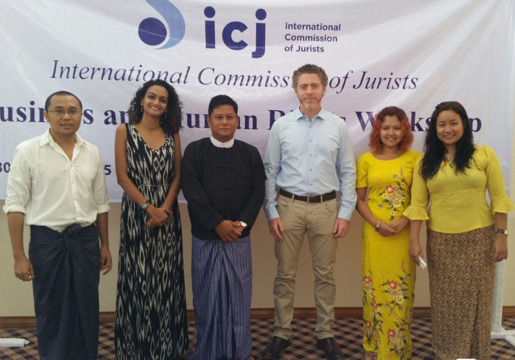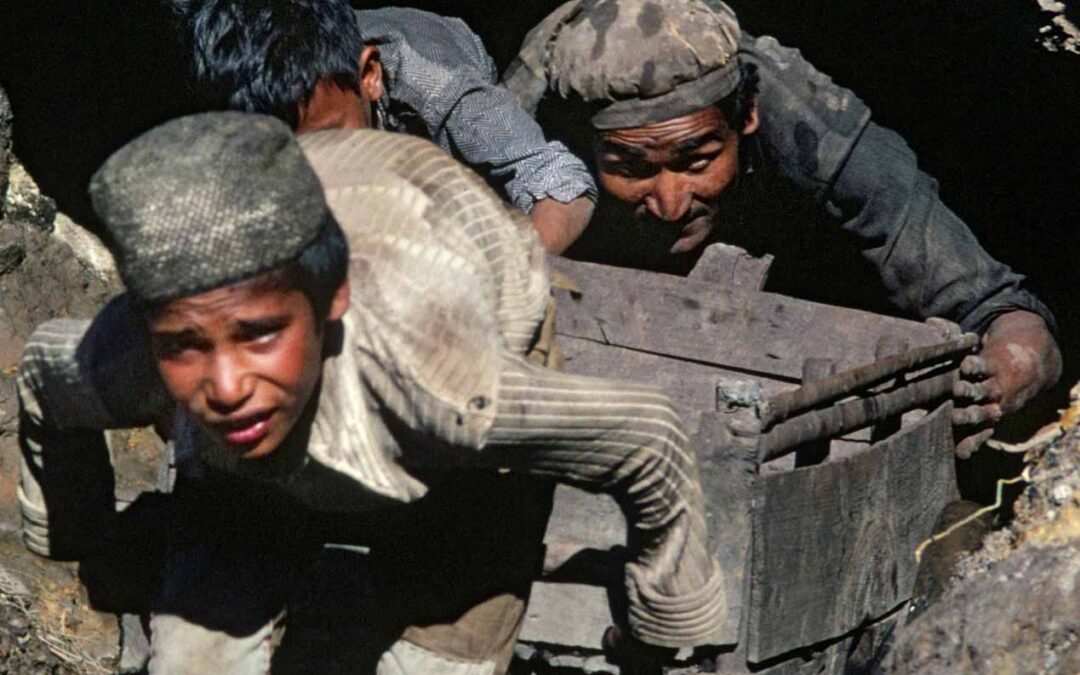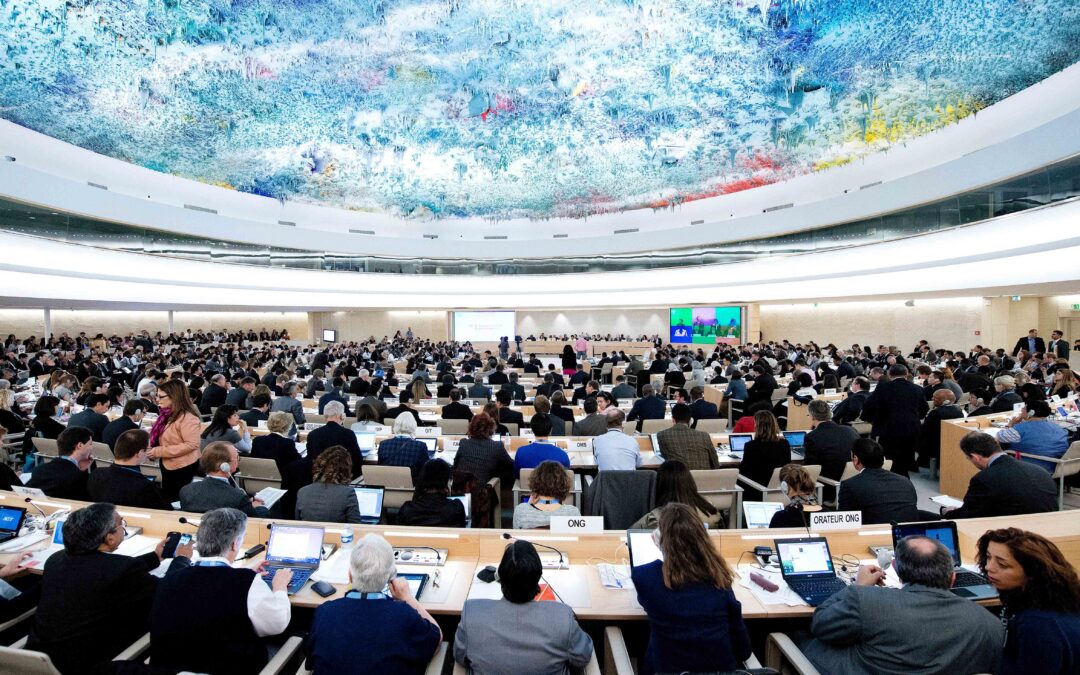
Jun 1, 2015 | News
The ICJ conducted a two-day workshop on “Business and Human Rights” in Kyauk Phyu, Rakhine State on 30-31 May. The event was attended by 40 participants representing civil society organizations in Sittwe, Kyauk Phyu, Ann and Ponna Kyaunn.
It also included members from the township and district courts, township police force and members of parliament, focused on investment in Rakhine state in the absence of credible and transparent mechanisms to prevent human rights abuses.
The workshop occurred against the backdrop of myriad longstanding human rights issues in Rakhine State, including the humanitarian crisis confronting the state’s Rohingya population.
The State has also witnessed ongoing government repression of the State’s ethnic Rakhine population in response to demands for autonomy and their opposition to unregulated development of the State’s ample natural resources, including extensive gas deposits, at the expense of their livelihoods and rights.
The development of gas fields in the State has been fraught with human rights violations, including of forced labour and forced eviction of thousands of farmers from their lands.
As discussed during the workshop, since Myanmar’s relative opening up, the government has continued to invite and approve of foreign investors to develop resource extraction projects in Rakhine State, while locals resist the potential harmful effects of such projects on their livelihoods, properties and environment.
In 2013, hundreds of villagers protested against the adverse impacts of the Shwe gas pipeline construction – a large scale natural gas project developed by Daewoo International of South Korea in a joint venture with Myanmar Oil and Gas Enterprise.
Daewoo has once again ventured into Rakhine State, proposing a coal power plant in Kyaukphyu township, that could have adverse effects on the economic and environmental landscapes in local communities.
During ICJ’s previous trips to Sittwe and Kyaukphyu, local civil society activists had asked for information on responsible investment and national and international standards relating to displacement, land confiscations, and environmental and social impact assessments.
In the first day of the workshop, U Kyaw Min San, ICJ’S National Legal Adviser, led the discussion on fundamental citizen rights guaranteed in Myanmar legislation as well as an analysis of the land laws in Myanmar.
Daniel Aguirre, ICJ’s International Legal Adviser, gave an overview of international human rights law and the role of States and business corporations in protecting and respecting economic, social and cultural rights.
Vani Sathisan, ICJ’s International Legal Adviser, provided a legal analysis of Myanmar’s law on Special Economic Zones (SEZ), highlighting how the law fails to guarantee the protection of human rights and the environment while providing tax reliefs and exemptions, as well as land leases, to win over investors and developers.
On the second day, Daw Tin Tin Wai, Private Sector Policy Officer from Oxfam GB and a Campaign Officer from EarthRights International shared their experiences from Dawei SEZ and Thilawa SEZ, respectively.
They shared that lack of consultations with local communities and large-scale land confiscations through intimidation and threats occurring in the two SEZs reflected flaws in the government and judiciary to protect human rights and provide for access to remedy.
The workshop included a group discussion among the participants focusing on the role of local and international non-governmental organizations in Kyauk Phyu, Ponna Kyunn and Sittwe, the current situation of Kyauk Phyu SEZ and Ponna Kyunn industry zone and land issues related to such development projects.
Hayman Oo, ICJ’s Legal Researcher, facilitated the discussion, which served to highlight the specific themes around which the CSOs were organizing their advocacy and research.
At the closing dinner, U Kyaw Min San extended the ICJ’s appreciation to all the local CSOs for their participation and active engagement, and reiterated the ICJ’s support to work with community-driven organizations to work on recommendations to the government and businesses on transparency, prior consent and consultation, and compensations, and to push for a more rights-compliant approach to investments in Kyaukphyu.

Mar 17, 2015 | Events, News
This side event will take place on Thursday 19 March 2015, 12.00-14.00, at the Palais des Nations, Geneva, Room XXVII.
It aims at creating a space to discuss the EU agenda on Business & Human Rights, identifying current challenges and development, and exploring opportunities arising from the Treaty process.
Panelists:
Mons. Silvano Tomasi, Holy See, Permanent Observer
Mr. Jerome Bellion-Jourdan, Delegation of the European Union to the UN
Mrs. Elena Valenciano, European Parliament Sub-Committee on Human Rights, Chair
Mr. Richard Meeran, Leigh Day, Partner
Ms. Anne van Schaik, Friends of the Earth Europe, Economics and Justice Team
Moderation: Dr. Carlos Lopez, International Commission of Jurists, Senior Legal Adviser
Erope-Flyer side-event EU BHR perspectives-News-event-2015-ENG (ful text in PDF)

Mar 9, 2015 | Advocacy
The ICJ supported a statement commenting on the respective reports by the Independent Expert on the Environment and Human Rights and the Independent Expert on Foreign Debt and its impact on Human Rights.
In the context of the Interactive Dialogue with the Independent Experts in the 28th Session of the Human Rights Council, Franciscans International and the Center of Concern, with the support of the ICJ, noted that the reports address, from different perspectives, a wide range of connections between the private sector and governments that many times result in human rights abuses.
The report by the Independent Expert on human rights and the environment, presented an encouraging set of good practices to mitigate environmental damage and its human rights impact.
The report by the Independent Expert on Foreign Debt and its impact on human rights highlighted the links between private lending and the abuses committed by authoritarian regimes.
This report will be followed by another report on applicable legal standards and analysis of whether additional international standards are needed.
Universal-Statement on BHR at HRC28-Advocacy-2015-ENG (full text in PDF)

Mar 2, 2015 | Advocacy, Open letters
The ICJ today joins with dozens of other NGOs from around the world in an open letter calling for the UN Human Rights Council to establish a Special Rapporteur on Privacy at its current session.
The UN General Assembly, the UN High Commissioner for Human Rights, existing special procedure mandate holders, and many states and civil society organisations have recognized the pressing need to provide continuous, systematic and authoritative guidance on the scope and content of the right to privacy as enshrined in article 12 of UDHR and article 17 of ICCPR. Significantly, all of them have identified the need to assess and monitor the ongoing implementation of this right. The creation of a Special Rapporteur would fill this long-standing gap.
Although the initiative, led by Germany and Brazil, has its origins in concerns about online and telecommunications surveillance, the call is for the creation of a Special Rapporteur with a mandate to look at all aspects of the right to privacy, in all contexts, including issues relating to private sector practices.
HRC28-SRPrivacy-Advocacy-JointLetter-2015

Feb 9, 2015 | News
Myanmar should continue working with all stakeholders, including affected communities and civil society, to promote a legal framework that balances investors’ needs with human rights, said the ICJ today.
The call comes as the government enters a critical phase of establishing its new law governing investments in the resource-rich country.
“This is a critical moment for the economic development of Myanmar. The laws it implements now will shape investment, economic development and, in turn, human rights for the foreseeable future,” said Daniel Aguirre, ICJ International Legal Advisor. “It is imperative that drafting is not rushed and that laws take into account international human rights laws and standards.”
ICJ has been working directly with Myanmar’s Directorate of Investment and Company Administration (DICA), as well as with Myanmar civil society, on investment law and their potential impact on the human rights of all people in Myanmar.
The International Finance Corporation, in support of DICA, has produced a Draft Investment Law designed to consolidate the Foreign Investment Law (2012) and the Myanmar Citizen Investment Law (2013) to create a level playing field for both local and foreign investors. DICA has now opened the process to civil society consultation.
ICJ conducted a workshop with DICA on bilateral investment treaties in July of 2014. In November, the ICJ submitted feedback on the Draft Investment Law providing expert analysis and flagging issues of concern.
An initial consultation on the Draft Investment Law took place on 29 January 2015. The ICJ along with other civil society organizations met with the IFC and DICA.
“The ICJ is encouraged by DICA’s willingness to consult civil society, including international non-governmental organizations, and hear concerns about investment laws and their potential to curtail important regulations designed to protect, promote and fulfill human rights,” said Aguirre. “The ICJ looks forward to formal engagement in a consultation process that will include both national and international civil society.”
The ICJ remains concerned that the Draft Investment Law establishes significant rights for investors without protecting the rights of those affected by business activity.
The Draft Investment Law would require investors to follow national laws without acknowledging that the existing national legal framework does not adequately protect human rights or provide remedies for those whose rights have been violated.
Furthermore, the Draft Investment Law does not establish or protect Myanmar’s ‘right to regulate’ to protect human rights or other social or environmental needs.
Investment law should indicate Myanmar’s obligation to enact necessary regulations for the protection of human rights, including economic and social rights such as the right to health, in the future in order to avoid legal disputes when adopting these regulations.
“The Draft Investment Law’s proposed legal framework would provide all investors the right to be consulted and challenge any new national law or regulation that may impact their profits,” said Aguirre. “This framework would allow businesses to challenge government policies aimed at addressing legitimate needs within the country, and it could create a regulatory chilling effect in which Myanmar’s government would find itself in the troubling position of evaluating whether the passage of new social policies would lead to costly lawsuits from investors.”
“The draft Law as currently formulated runs the risk of hindering progressive regulation to protect human rights in Myanmar,” said Aguirre. “The ICJ is encouraged that DICA has begun meeting with non-governmental groups and believes that an effective and meaningful consultation will help address key concerns about the Draft Investment Law. The ICJ looks forward to working with the Myanmar Government, with the IFC, and with all other concerned groups in order to promote a law that balances investors’ needs with human rights.”









